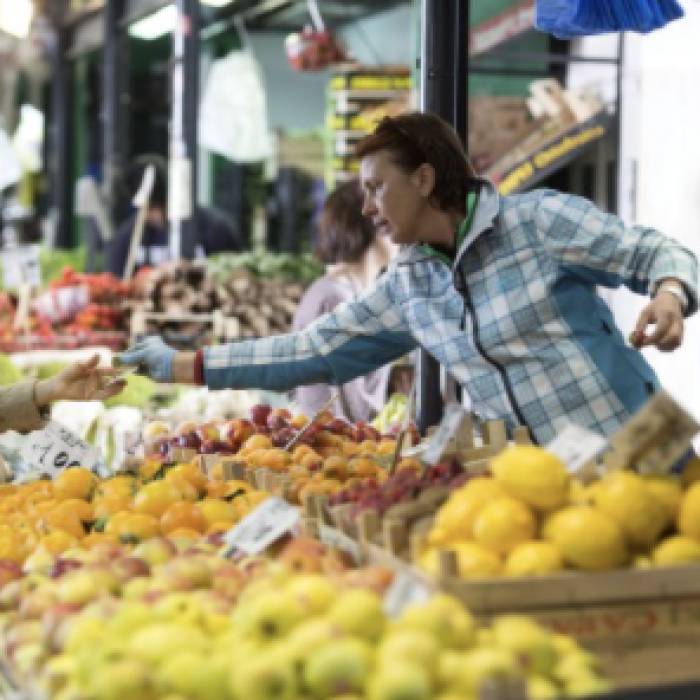
Revealing the hidden costs of agrifood systems to enhance their value
Background document to the FAO flagship The State of Food and Agriculture 2023. Agrifood systems are invaluable to society. However, they also contribute to climate change and natural resource degradation while failing to provide healthy diets to all. Many of these impacts are not included in market...
Digital agriculture report: Rural e-commerce development experience from China

The ‘Digital Agriculture Report: Rural E-commerce Development—Experience from China’, produced by FAO and Zhejiang University, has been officially released. The publication examines how rural e-commerce could advance the digital transformation of agri-food systems, including increasing production efficiency, expanding farmers’ market access, improving poverty alleviation, fostering agricultural entrepreneurship, and attracting young generations back to their villages for economic revival and rural revitalization.
It is highlighted that an enabling ecosystem with favourable government policies and strategies, public-private partnerships and innovative business models is of great importance to accelerate the development of rural areas in China, and generate larger economic, social and environmental impacts. As the largest developing country in the world, the experience of digital agriculture transformation in China could be shared with other developing countries.
The report also discusses some of the challenges encountered and lessons learned during the development of rural e-commerce, as well as the proposals for the way forward.
The report is available in English and can be downloaded here.
WEBINAR - E-commerce for agriculture and rural development

The agricultural sector will face enormous challenges to feed the projected 9.6 billion people who will inhabit the planet by 2050. The COVID-19 pandemic has resulted in severe economic and social distress around the world, triggering several negative impacts on agri-food systems. However, e-commerce entered the outbreak period ahead of time, especially in the agri-food sector, and with the new opportunities it creates, it is considered a potential solution to this difficult situation.
To continue its active work in promoting digitilization of the agricultural sector, FAO, in close collaboration with the International Telecommunication Union (ITU) and Zhejiang University (ZJU), participates in the World Summit on the Information Society (WSIS) Forum.
Following WSIS Action Line C7 on eAgriculture that focuses on using ICT applications for e-agriculture, the jointly organized webinar "E-commerce for agriculture and rural development" will aim at enhancing knowledge and exchanging experiences, involving a wide range of experts from various organisations, institutions, academia, and private sector businesses, including the Inter-American Development Bank (IDB), Alibaba, and African young e-commerce entrepreneurs.
During the event, the Digital Agriculture Flagship Report will be presented, which is based on experiences with successful business models and on results of technology applications in the field of rural e-commerce in China.
The webinar takes place on Friday, 7 May 2021, 15:00–16:00 (CEST).
For more information on this event and to register, please click here.

Socio-legal empowerment and agency of small-scale farmers in informal markets
Producers trading in informal agricultural markets in low- and middle-income countries make daily choices concerning their livelihood and marketing strategies. Different contexts present varying degrees of market power and knowledge asymmetries across value chains and trading relations. In general...
FAO Food Price Index rises sharply

Global food commodity prices rose sharply in November to their highest level in nearly six years, according to a benchmark United Nations report released on 3 December 2020.
The FAO Food Price Index averaged 105.0 points during the month, up 3.9 percent from October and 6.5 percent higher than its value a year earlier. The monthly increase was the sharpest since July 2012, putting the index at its highest level since December 2014, the Food and Agriculture Organization said.

Inclusive public school food procurement to improve schoolchildren nutrition
Public School Food Procurement can be an effective tool for improving the nutrition of schoolchildren and to integrate local producers into school food programmes. The aim of this discussion is to exchange experiences and lessons learned among experts of the region, as well as to identify good practices, challenges and barriers to an effective public school food procurement.

2019 Africa Regional Overview of Food Security and Nutrition
In the 2017 and 2018 editions of the Africa Regional Overview of Food Security and Nutrition, FAO reported that the prevalence of undernourishment was rising in the region. The latest data shows that the deterioration has slowed, but there remain 256 million hungry people in Africa today. The report...

OECD-FAO Agricultural Outlook 2020-2029
The Agricultural Outlook 2020-2029 is a collaborative effort of the Organisation for Economic Co-operation and Development (OECD) and the Food and Agriculture Organization (FAO) of the United Nations. It brings together the commodity, policy and country expertise of both organisations as well as...

Responding to the impact of the COVID-19 outbreak on food value chains through efficient logistics
This document summarizes the online discussion Responding to the impact of the COVID-19 outbreak on food value chains through efficient logistics held on the FAO Global Forum on Food Security and Nutrition (FSN Forum) from 4 June to 6 July 2020. The discussion was facilitated by Marco V. Sánchez...

The State of Agricultural Commodity Markets 2020
The State of Agricultural Commodity Markets 2020 (SOCO 2020) aims to discuss policies and mechanisms that promote sustainable outcomes – economic, social and environmental – in agricultural and food markets, both global and domestic. The analysis is organized along the trends and challenges that lie...
